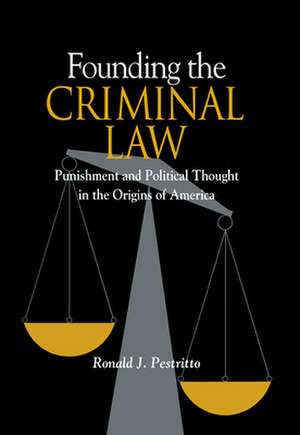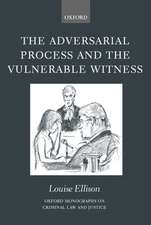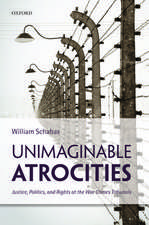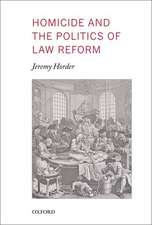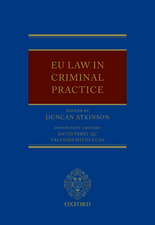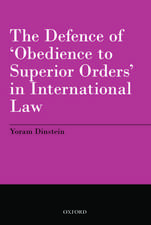Founding the Criminal Law: Punishment and Political Thought in the Origins of America
Autor Ronald J. Pestrittoen Limba Engleză Hardback – 31 oct 1999
Why does society punish criminals? What political principles underlie the determination of punishment to suit the crime? In Founding the Criminal Law, Pestritto studies policies concerning crime and punishment in early America to better understand political thought during the founding era, bringing fresh insights to modern debates about the consequences of lawbreaking.
Basing his research on original government documents, state constitutions, the arguments of America's founders, and the writings of such influential reformers as William Penn, William Bradford, and Thomas Jefferson, Pestritto analyzes the complex mix of punishment philosophies at work in early America. He shows how the political principles that guided America's founders in their selection of criminal punishments contribute to the current debate over crime and justice in America. Impressive and interdisciplinary, Founding the Criminal Law holds particular interest for political scientists, American and legal historians, and criminal justice scholars.
Basing his research on original government documents, state constitutions, the arguments of America's founders, and the writings of such influential reformers as William Penn, William Bradford, and Thomas Jefferson, Pestritto analyzes the complex mix of punishment philosophies at work in early America. He shows how the political principles that guided America's founders in their selection of criminal punishments contribute to the current debate over crime and justice in America. Impressive and interdisciplinary, Founding the Criminal Law holds particular interest for political scientists, American and legal historians, and criminal justice scholars.
Preț: 361.83 lei
Nou
Puncte Express: 543
Preț estimativ în valută:
69.24€ • 75.44$ • 58.34£
69.24€ • 75.44$ • 58.34£
Carte tipărită la comandă
Livrare economică 23 aprilie-07 mai
Preluare comenzi: 021 569.72.76
Specificații
ISBN-13: 9780875802602
ISBN-10: 0875802605
Pagini: 207
Dimensiuni: 140 x 216 x 20 mm
Greutate: 0.41 kg
Ediția:1
Editura: Northern Illinois University Press
Colecția Northern Illinois University Press
ISBN-10: 0875802605
Pagini: 207
Dimensiuni: 140 x 216 x 20 mm
Greutate: 0.41 kg
Ediția:1
Editura: Northern Illinois University Press
Colecția Northern Illinois University Press
Recenzii
"If criminal justice lawmakers have time to read just one book about the purposes and justifications for punishment, this is it."—Joseph M. Bessette, Claremont McKenna College
"Underscores the important moral norm-setting function of criminal sanctions and illuminates an aspect of the Founders' thinking that has not yet been thoroughly canvassed by scholars."—Christopher P. Manfredi, McGill University
"Underscores the important moral norm-setting function of criminal sanctions and illuminates an aspect of the Founders' thinking that has not yet been thoroughly canvassed by scholars."—Christopher P. Manfredi, McGill University
Cuprins
Table of Contents
Introduction
Part I: Reform in Early America
1. The Pennsylvania Experience
2. The Success of Pennsylvania's Reformers
3. The Spread of Reform?: The Cases of Virginia and New York
Part II: The Roots of the Punishment Debate
4. The Enlightenment Utility and Amendment
5. Answering the Enlightenment: Moral Idealism and Punishment as Power
6. A More Comprehensive Approach: Ancient and Medieval Political Thought
Part III: Just Punishment and the Founding Debate
7. Reevaluating the Reform Movement
8. Punishment and the Founders
Conclusion: The Founders and the Contemporary Debate
Notes
Bibliography
Index
Part I: Reform in Early America
1. The Pennsylvania Experience
2. The Success of Pennsylvania's Reformers
3. The Spread of Reform?: The Cases of Virginia and New York
Part II: The Roots of the Punishment Debate
4. The Enlightenment Utility and Amendment
5. Answering the Enlightenment: Moral Idealism and Punishment as Power
6. A More Comprehensive Approach: Ancient and Medieval Political Thought
Part III: Just Punishment and the Founding Debate
7. Reevaluating the Reform Movement
8. Punishment and the Founders
Conclusion: The Founders and the Contemporary Debate
Notes
Bibliography
Index
Descriere
Why does society punish criminals? What political principles underlie the determination of punishment to suit the crime? In Founding the Criminal Law, Pestritto studies policies concerning crime and punishment in early America to better understand political thought during the founding era, bringing fresh insights to modern debates about the consequences of lawbreaking.
Basing his research on original government documents, state constitutions, the arguments of America's founders, and the writings of such influential reformers as William Penn, William Bradford, and Thomas Jefferson, Pestritto analyzes the complex mix of punishment philosophies at work in early America. He shows how the political principles that guided America's founders in their selection of criminal punishments contribute to the current debate over crime and justice in America. Impressive and interdisciplinary, Founding the Criminal Law holds particular interest for political scientists, American and legal historians, and criminal justice scholars.
Basing his research on original government documents, state constitutions, the arguments of America's founders, and the writings of such influential reformers as William Penn, William Bradford, and Thomas Jefferson, Pestritto analyzes the complex mix of punishment philosophies at work in early America. He shows how the political principles that guided America's founders in their selection of criminal punishments contribute to the current debate over crime and justice in America. Impressive and interdisciplinary, Founding the Criminal Law holds particular interest for political scientists, American and legal historians, and criminal justice scholars.
